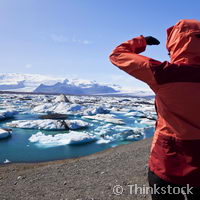CORDIS Express: Research in the Arctic and Antarctic
The Western Antarctica ice sheet is collapsing. And the process is now unstoppable, according to researchers from NASA and the University of Washington. This could mean a staggering four-metre sea level rise. However, we probably won't be around to see it - it may not happen for another 1 000 years. Meanwhile, at our other pole, the Arctic sea ice has retreated by 12 % per decade since the late 1970s. The National Snow and Ice Data Center (NSIDC) tells us that May 2014 represented the third lowest extent of sea ice during that month on record. Experts predict that the region will have ice-free summers within the next 30 to 40 years. Ice loss in the Arctic is caught in a vicious circle - also known as a feedback loop: Ice melts leaving thinner ice which is less reflective than thick ice. This allows for more sunlight to be absorbed by the ocean, which in turn weakens the ice and warms the ocean even more. Our poles are the most sensitive regions to climate change on Earth. And we are now seeing how the loss of sea ice has the potential to accelerate global warming trends and to change climate patterns. Exploring the unique species hosted in the Arctic and Antarctica and monitoring permafrost, sea ice and sea level changes is vital to understanding our planet, and how it may be changing. That's why the EU has made a contribution of EUR 20 million per year to Arctic research over the last decade and why support for such research continues to be supported under Horizon 2020. This edition of CORDIS Express looks at projects that are exploring, monitoring and developing tools for the Arctic and Antarctic regions to give us a better understanding of the changes that are taking place there. Trending science: Drifting icebergs fundamentally changing seafloor life Changing permafrost and effects on climate Finding out what drives sea-level rise New sea-ice monitoring tools developed Monitoring climate change in the Arctic



